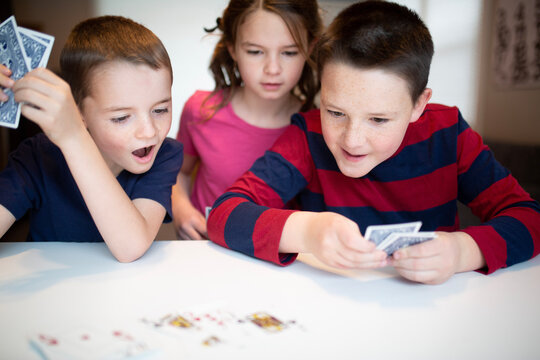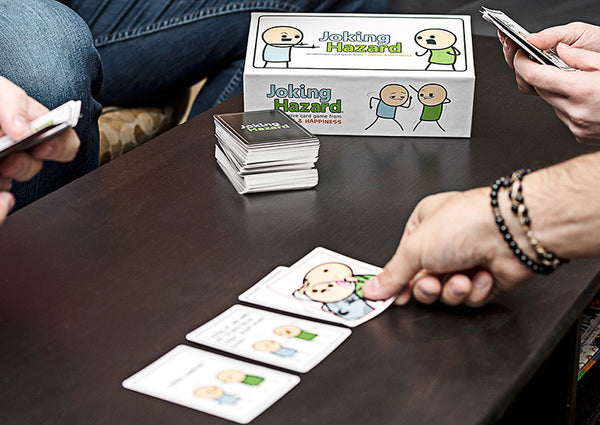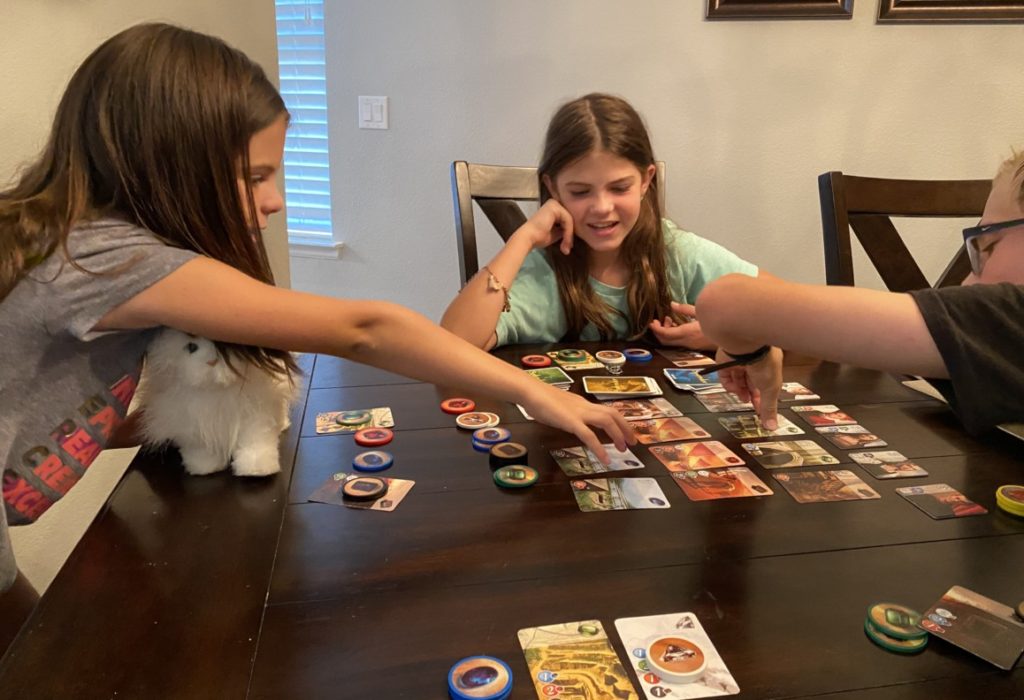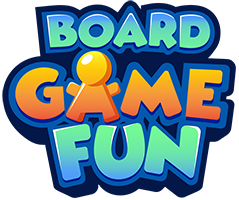I Really Wish I Knew These Card Games for 3 People When Starting Out!
Key Takeaways:
-
What are card games?
-
Benefits of playing card games
-
Why choose games designed for three players?

Choosing games specifically designed for three players offers a unique balance of strategy and interaction, making the gaming experience more engaging and dynamic. With three players, there’s an optimal level of competition and cooperation, ensuring everyone is actively involved in the gameplay. This group size is perfect for creating a balanced and intimate atmosphere, where each player has a significant impact on the game's outcome. Games for three players strike a perfect harmony between the intensity of head-to-head duels and the complexity of larger group dynamics, providing a fulfilling experience for all participants.
Finding the perfect card game for three players can be a delightful challenge. Whether you're looking for a quick and engaging game night or a more strategic and intense competition, three-player card games offer a unique balance of camaraderie and challenge. In this blog, we'll explore some of the top card games that are perfect for groups of three.
Why Play Card games for 3?

-
Balanced Interaction:
-
Three-player card games ensure that each participant has a significant role in the game's outcome, fostering balanced interaction where strategic decisions directly impact gameplay.
-
This balance avoids the potential for alliances to dominate the game, ensuring a fair and competitive environment.
-
Players can enjoy a mix of strategic planning and reactive play, making each session dynamic and engaging.
-
-
Strategic Depth:
-
Games designed for three players often provide ample room for strategic depth and complexity, allowing players to explore various tactics and adapt their gameplay strategies.
-
With fewer players, there's more opportunity for each individual's strategy to unfold and influence the game's progression, creating a compelling mental challenge.
-
Strategic decisions, such as card management and timing, become pivotal, encouraging players to think ahead and anticipate their opponent's moves.
-
-
Intimate Atmosphere:
-
The smaller group size fosters a more intimate and relaxed atmosphere, ideal for meaningful interactions and discussions among players.
-
Players can engage more deeply with the game and each other, enhancing camaraderie and social bonding over shared gaming experiences.
-
This intimate setting often leads to memorable moments and closer friendships, as players enjoy the game's challenges and victories together.
-
-
Accessible Gameplay:
-
Three-player card games tend to have simpler rules and mechanics compared to games designed for larger groups, making them more accessible for players of varying skill levels.
-
This accessibility ensures that new players can quickly grasp the game's fundamentals and join in the fun without feeling overwhelmed.
-
Quick setup times and straightforward gameplay mechanics allow for more frequent play sessions and easier integration into casual gaming environments.
-
-
Versatile Options:
-
There is a wide variety of card games specifically designed for three players, ranging from classic favorites to innovative new designs with diverse themes and mechanics.
-
This diversity ensures that players can find games that match their preferences and interests, whether they enjoy strategy, luck-based challenges, or thematic storytelling.
-
The availability of different game styles offers opportunities for players to explore new genres and expand their gaming horizons while enjoying the familiarity of card-based gameplay.
-
-
Social Bonding:
-
Playing card games with three players encourages social interaction, communication, and collaboration among participants.
-
Through shared experiences and friendly competition, players strengthen friendships and build social skills, fostering a sense of community and camaraderie.
-
The collaborative aspects of some games can enhance teamwork and cooperation, providing opportunities for players to work together towards common goals and celebrate shared achievements.
-
Top 5 Card Games for 3 Players
Save the Dinosaurs

If you're looking for a delightful and engaging game for your children, "Save the Dinosaurs" is an excellent choice. This card game is designed for young dinosaur enthusiasts and offers a perfect blend of fun, strategy, and education.
Game Overview
If you're looking for a delightful and engaging game for your children, "Save the Dinosaurs" is an excellent choice. This card game is designed for young dinosaur enthusiasts and offers a perfect blend of fun, strategy, and education. The goal is to match 5 of the same kinds of cards and grab a dinosaur meeple before the other player does!
How to Play
-
Setup: Shuffle the deck of cards and deal a specific number of cards to each player, depending on the number of players. Place the remaining cards face down in a draw pile.
-
Gameplay: Players take turns drawing a card from the draw pile and then playing one card from their hand. The cards depict various dinosaurs, threats (such as meteors or predators), and rescue actions (like building a shelter or creating a distraction).
-
Rescue Missions: To save a dinosaur, players need to use the appropriate rescue action card that matches the threat facing the dinosaur. For example, if a dinosaur is threatened by a meteor, the player needs to play a shelter card to save it.
-
Teamwork and Strategy: Players must work together, planning their moves strategically to ensure the safety of as many dinosaurs as possible. Communication and cooperation are key to winning the game.
-
Winning the Game: The game ends when all the dinosaurs are either saved or lost. Players tally up the number of dinosaurs they've successfully rescued. The team with the most saved dinosaurs wins the game.
Discover the joy of saving dinosaurs and creating unforgettable family memories with "Save The Dinosaurs" card game. Roar into the adventure today and let the dinosaur fun begin!
Old Maid
:max_bytes(150000):strip_icc()/grandmother-and-grandchildren-playing-cards-at-home-713769383-5a6f0200312834003611d344.jpg)
Old Maid is a classic card game that has been a favorite for generations. It's simple to learn, quick to play, and a fun card game offers a good mix of luck and strategy. The game is perfect for three players, providing plenty of opportunities for laughter and surprises.
Basic Rules for Three Players
To start, a standard deck of cards is used, but one card is removed to create an odd number of cards—typically, one of the remaining cards of the Queens, transforming the remaining Queen into the "Old Maid."
-
Dealing the Cards: Shuffle the deck and deal all the cards to the three players. Some players may have one more card than others, which is fine.
-
Forming Pairs: Each player looks at their hand and removes any pairs they have. Pairs are two cards of the same rank and color, like two red threes or two blackjacks.
-
Taking Turns: Players take turns in a clockwise direction. On your turn, draw a card from the hand of the player to your left without looking at it. If you form a pair with the drawn card, set the pair aside. If not, keep the card.
-
End of the Game: The game continues until all pairs are matched and set aside. The player left holding the unpaired Queen, the "Old Maid," loses the game.
Old Maid is a fun card game full of light-hearted fun, perfect for a casual gathering with three players. Its simplicity ensures that everyone can join in and enjoy the fun game together, while still allowing for some clever strategies to enhance the experience.
Reigning Unicorns

Easy-to-Understand Rules
Reigning Unicorns is a whimsical card game that's perfect for three players. It's easy to learn and quick to play, making it ideal for all ages.
Setup: Shuffle the deck and deal five cards to each player. Place the remaining deck in the center to form a draw pile.
Objective: The goal is to collect sets of unicorns. A set consists of three unicorns of the same color.
Gameplay: On their turn, a player can either:
-
Draw a card from the draw pile.
-
Trade a card with another player, offering one of their cards face-down and asking for a specific card in return. The other player can accept or decline the trade.
-
Play a card by placing it face-up in front of them if they have a set of three matching unicorns.
-
Special Cards: There are a few special cards in the deck:
-
Rainbow Unicorn: This card can be used as any color to complete a set.
-
Wild Unicorn: This card allows a player to steal a random card from another player's hand.
-
-
End of Game: The game ends when all sets are completed, or the draw pile is exhausted.
Reigning Unicorns is a delightful game that combines strategy and luck, making it a fantastic choice for three players. Its simple rules ensure that everyone can join in the fun, while the strategic elements keep the game exciting and competitive.
Would You Rather

Explanation of the Game Setup and Objective
"Would You Rather" is a classic party game that's perfect for three players, encouraging fun discussions and revealing insights into each other and the third player's preferences. The game setup is simple, requiring minimal materials:
-
Setup: Gather a list of "Would You Rather" questions. You can create your own, find them online, or use a deck of cards specifically designed for the game.
-
Objective: The goal is to choose between two challenging scenarios and guess the choices of your opponents. This leads to interesting conversations and helps players learn more about each other.
Would You Rather is a versatile game that can be tailored to any group, making it perfect for three players. With the right number of tricks, questions, and strategies, you'll enjoy conversing and learning more about each other's preferences and personalities.
Joking Hazard

Overview of the Game Mechanics and Setup
Joking Hazard is a card game where players create humorous and often outrageous comic strips using pre-drawn panels. The game is based on the popular webcomic Cyanide & Happiness, and it's designed as many tricks can for players who enjoy dark humor and creative storytelling.
Setup:
-
Deck: The game includes a deck of comic panels. Shuffle the deck and deal seven cards to each player.
-
Judge: Choose a player to be the first judge. The judge rotates clockwise after each round.
-
Starter Card: The judge draws a card from the deck and places it face-up in the center to start the comic strip. They then draw a second card and place it either before or after the starter card, creating a two-panel setup.
Joking Hazard is a game of creativity, wit, and understanding your fellow poker players'' humor. By strategically selecting your cards and paying attention to playing cards due to the judge's preferences, you can maximize your chances of creating hilarious comic strips and winning rounds.
How to Improve Your Skills in 3 Player Card Games

Set Up a 3-Player Card Game Night
Know Your Players:
-
Preferences: Find out what types of games the players enjoy (strategy, luck-based, cooperative, competitive).
-
Skill Levels: Choose games that match the experience levels of the players to ensure everyone can participate and enjoy.
Creating a Comfortable and Inviting Gaming Environment
Setting Up the Space:
-
Table: Large enough to comfortably hold the game components and provide space for players to move cards.
-
Seating: Comfortable chairs for prolonged sitting.
Lighting:
-
Ensure the room is well-lit to prevent eye strain and to keep the atmosphere lively.
Ambiance:
-
Soft background music can enhance the mood without being distracting.
-
Consider theme-related decorations if they add to the fun (e.g., fantasy-themed decor for fantasy games).
Temperature Control:
-
Keep the room at a comfortable temperature to ensure players remain focused and comfortable.
Providing Snacks and Refreshments to Enhance the Experience

Snack Options:
-
Non-Greasy Snacks: Pretzels, popcorn, vegetable sticks, cheese cubes.
-
Sweet Treats: Cookies, chocolates, fruit.
Drinks:
-
Non-Alcoholic: Water, soda, juice, iced tea.
-
Alcoholic (if appropriate): Wine, beer, cocktails.
Accessibility:
-
Keep snacks and drinks within easy reach but not on the game table to avoid spills.
Consider Allergies and Preferences:
-
Check for any dietary restrictions or preferences of the players beforehand.
Establishing Clear Rules and Guidelines for Gameplay
Game Rules:
-
Review Beforehand: Ensure everyone knows the rules or have a quick rule explanation session.
-
Rule Book: Keep the rule book handy for quick reference.
House Rules:
-
Agree on any house rules or variations before starting the game to avoid confusion or disputes.
Turn Order and Pace:
-
Turn Timer: Use a timer for turns if the game tends to drag, keeping the game moving smoothly.
-
Encourage Engagement: Ensure everyone is involved and paying attention, even when it's not their turn.
Conflict Resolution:
-
Establish a method for resolving disputes (e.g., majority vote, referring to the rule book).
By following these guidelines, you can create an enjoyable and memorable card game night for all players involved.
Top 3 Questions Answered

What Are Card Games?
Card games are tabletop games that use a deck of cards as the primary component. They can range from traditional games like poker and bridge to modern creations like Save the Dinosaurs and Joking Hazard. Each game has its own set of rules and objectives, often involving drawing, discarding, and strategically playing cards to achieve a specific goal.
What are the benefits of playing card games?
Playing card games offers numerous benefits, including enhancing critical thinking and strategic planning skills. They improve memory and concentration, as players need to track cards and remember rules. Card games also promote social interaction, providing a fun and engaging way to bond with friends and family.
Why Choose Games Designed for Three Players?
Games designed for three players offer a balanced and dynamic gameplay experience, where each participant has a significant role. This setup ensures fair competition and avoids the dominance of alliances, making it suitable for intimate gatherings. Three-player games also typically feature simpler rules and quicker playtimes, making them accessible and enjoyable for players of all skill levels.
The Perfect Trio
Playing card games for 3 players adds a unique and engaging experience, blending competition with camaraderie. The dynamic interactions and strategic thinking required in many games can foster deeper connections among players and stimulate mental agility. With three participants, classic card games are less likely to be dominated by alliances or a single player's strategy, ensuring a balanced and enjoyable session for everyone. This intimate group size allows for meaningful conversations and a more personal gaming experience, making it an ideal setting for both casual and serious gamers to bond and have fun.

Each game brings its player wins own set of challenges and rewards, offering fresh experiences and learning curves. By exploring different types of card games, players can expand their horizons, find new genres they enjoy, and improve their gameplay skills.
Sharing your experiences, strategies, and tips with fellow players can enhance the enjoyment for everyone involved. Whether it's through online forums, local game nights, or casual conversations with friends, discussing your favorite games and learning from others' insights can lead to new friendships and a deeper appreciation for the hobby. By connecting with other card game lovers, you can stay updated on the latest games, discover new strategies, and continuously improve your gameplay.
Start playing your some fun card games now and experience the thrill of every deal and draw!


